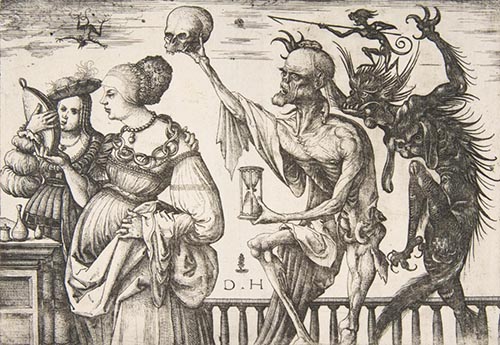메트뮤지엄 뒤러, 브뤼겔 동판화전(10/23-1/20, 2020)
Met Exhibition to Explore Etching through Early Experimentations and Masterworks by Albrecht Dürer, Francesco Parmigianino, Pieter Bruegel the Elder, and More
October 23, 2019–January 20, 2020
The Met Fifth Avenue,Galleries 691–693

Daniel Hopfer (German, 1471–1536). Death and the Devil Surprising two Women, ca. 1500–1510. Etching; first state of two. Plate: 6 3/16 x 8 7/8 in. (15.7 x 22.6 cm). Sheet: 6 5/16 x 8 15/16 in. (16 x 22.7 cm). The Metropolitan Museum of Art, New York, The Elisha Whittelsey Collection, The Elisha Whittelsey Fund, 1951 (51.501.383)
The emergence of etching on paper in Europe in the late 15th and early 16th centuries—when the technique moved out of the workshops of armor decorators and into those of printmakers and painters—was a pivotal moment that completely changed the course of printmaking. Opening October 23, The Renaissance of Etching will trace the first 70 years of the etched print through some 125 etchings created by both renowned and lesser-known artists, displayed alongside a selection of drawings, printing plates, etching tools, illustrated books, and armor. The works are drawn from the collections of The Met, The Albertina Museum, and a number of European and American lenders.
The exhibition is made possible by the Diane W. and James E. Burke Fund, the Placido Arango Fund, The Schiff Foundation, and Ann and Matthew Nimetz.
It is organized by The Metropolitan Museum of Art and The Albertina Museum.
The catalogue is made possible by the Drue E. Heinz Fund. Additional support is provided by the Tavolozza Foundation.
"When etching on paper was first introduced, the ease and access of the technique enabled artists to expand the reach of their work, and exchange ideas and images in a new way," said Max Hollein, Director of The Met. "This exhibition will offer a fascinating examination of this trailblazing moment, and an opportunity to appreciate a time in which the sharing of images—something we are so clearly immersed in today—underwent a revolutionary technical advancement."
"By focusing on the 70-year period right at the onset of this groundbreaking technology, we are able to observe artists at a time of great experimentation and creativity," added Nadine Orenstein, Drue Heinz Chair of Drawings and Prints at The Met. "The exhibition will show the dissemination of information between artists and their individual desire to embrace etching in creative ways—from Dürer's dense networks of lines in Germany to Parmigianino's use of colored inks in Italy, each artist tried to make the medium distinctive and unique."
Etching is an intaglio printmaking technique in which lines or areas on a metal plate are incised with acid in order to hold ink; the image on the plate is then printed onto paper. Artists today etch prints much the way they did in the early 16th century. In essence, the technique is equivalent to drawing on the surface of a printing plate. As a result, etching has an ease that opened the door for all kinds of artists to make prints. Among the pioneers of the medium are some of the greatest painters of the Renaissance, including Albrecht Dürer, Francesco Parmigianino, and Pieter Bruegel the Elder.
The Met's exhibition will begin at the end of the 15th century with the origins of etching in the workshop of the German printmaker and armor decorator Daniel Hopfer and then move on to explore the ways in which a range of artists from Germany, Flanders, Italy, and France began to experiment with the new medium. In the transition from armor to print, a technique used to create unique and costly armor for elite patrons transformed into one used to produce relatively inexpensive prints for a broad audience. Furthermore, what was once the artwork (the etched metal armor) was now the tool used to create the artwork (the metal plate printed on paper). The exhibition will conclude with the period around 1560, when the technique became professionalized and the Netherlandish print publisher Hieronymus Cock employed etchers to create prints after designs produced by other artists. This period marked a transition from the use of etching as a means of experimentation to its standardization and expansion by printmakers and print publishers.






